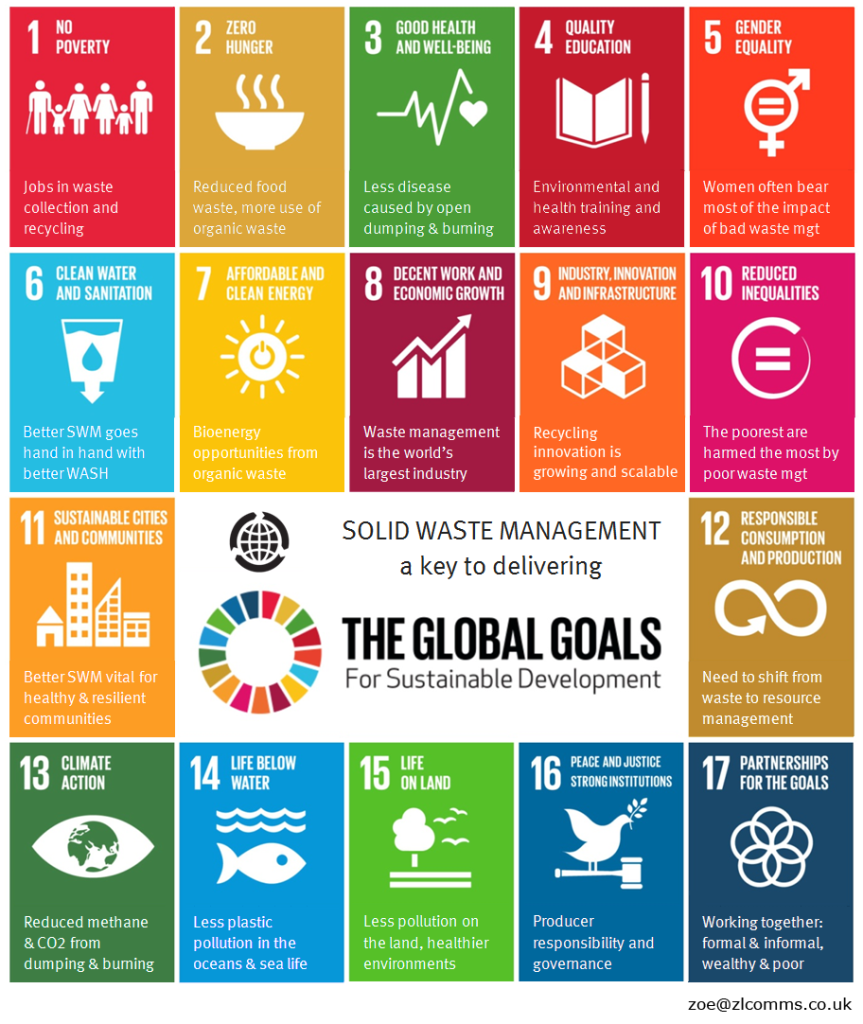Now is the time to recognise waste management is vital for global sustainable development
There are more than 7 billion of us, and we’re producing waste every day. A staggering half of that waste isn’t collected, treated or safely disposed of, and it’s causing a global waste crisis.
The Sustainable Development Goals (SDGs) cannot be met unless waste management is addressed as a priority. Failing economic models treat resources as if they were infinite (SDG 12) and consumption patterns favour the disposable. How can we continue with a growing and increasingly urbanised global population without getting waste sorted?
The proliferation of plastics has been devastating for the planet and its passengers, both current and future. Three-quarters of the vastest open dumps in the world are on the coast, leaching hazardous materials into our oceans. It’s unlikely that there is a single beach in the world that doesn’t carry the residues of plastic fishing nets, cigarette butts and plastic straws (SDG 14). Large marine mammals are washing up on shore dead, their bellies so full of plastic that they have starved.
Just two generations ago, before the dawn of disposable plastic, people could throw their waste on the ground and it would rot. Not so today, with plastic now clogging up drains and being ingested by livestock. Chemicals seep from immense quantities of dumped waste, poisoning groundwater, streams and rivers. Life on land (SDG 15) can only be healthy when waste is properly managed.
Waste is polluting the air we breathe as well. When people have no waste management services, they can only dump waste in the open – or burn it. Open burning of waste is sadly commonplace. In days gone by, it wasn’t such an issue. But now, with plastics everywhere, the health impacts of open burning are catastrophic (SDG 3). Added to this is the climate change impact of methane and CO2 from poorly managed waste: within ten years dumpsites could be responsible for up to a tenth of manmade greenhouse gases (SDG 13).

The local community burn their waste in a corner of Kibati camp. School desks have been taken out of the nearby school to make room for people now seeking shelter there. ( Eddy Mbuyi/Oxfam, Creative Commons 2.0)
If we want clean water and sanitation (SDG 6), we need to be looking at waste. It’s a key vector of disease, and provides abundant breeding grounds for mosquitoes. Women in particular can benefit hugely from improved waste management, through independent earning opportunities (SDG 5) and protecting their families from sickness caused by open dumping and burning.
Food waste, from farm to fork and post-consumer, needs to be cut dramatically. Redistribution of edible food (SDG 2) from supermarkets, restaurants and homes is an obvious first step and one that is thankfully gaining traction. Waste from the manufacture of food products can be fed to animals, and inedible remains converted into biogas and clean renewable energy (SDG 7).
Many children pick recyclable waste from dump sites instead of attending school
SDG 1 aims for No Poverty. 1% of the global urban population make their living from recovering recyclable materials from waste (SDG 8). These informal waste champions provide a valuable and often no-cost service, and it is important that we recognise their role in urban sanitation and resource efficiency (SDG 10). Fair wages and basic employment rights for all waste workers are fundamental to equal, inclusive and sustainable communities.
The rewards of waste management far outweigh the cost. For our communities to prosper as healthy and resilient places to live, governments must urgently invest. Even the poor choose to pay for waste management (or participate in it) when they see its benefits. Producer Responsibility schemes and crucially – fiscal transparency – can help ensure everyone pays their fair share to keep the planet clean (SDG 16).
The formal waste management sector, employing another 20 million globally, is a current hotbed of inspiration and innovation (SDG 9). Attracting millennials, entrepreneurs and industry heavyweights, waste management provides excellent opportunities in science, technology and engineering, humanities, business studies and IT (SDG 4), and is a powerful catalyst for economic growth (SDG 8). The feedstock for an industry based on waste is plentiful.

An estimated 3bn coffee paper cups are thrown away in the UK every year, but it was revealed that fewer than one in 400 is recycled. Photograph: Guardian/Alamy
Sustainable waste management provides ideal opportunities to collaborate and work in partnership (SDG 17) – the wealthy and the poor, the formal and informal, communities, business, governments and the international donor community. Indeed, it is only when we work together that the most logical and valuable answers arise. As we have seen, waste crosses so many other aspects of society. Positive outcomes rely on us joining these dots.
In summary, we can achieve the Global Goals – and we’ll do it much more effectively once we recognise waste management as a powerful driver of sustainable development.
How waste management can help achieve the Global Goals





Thank you
Thank you Charles, I’m glad you found it helpful. I have recently authored a report for the United Nations Environment Programme titled ‘Towards Zero Waste: a catalyst for delivering the Sustainable Development Goals’ which discusses the huge potential benefits of waste reduction and waste management for planetary and human health. You can find the report and launch webinar here: https://www.unep.org/ietc/resources/report/towards-zero-waste-catalyst-delivering-sustainable-development-goals